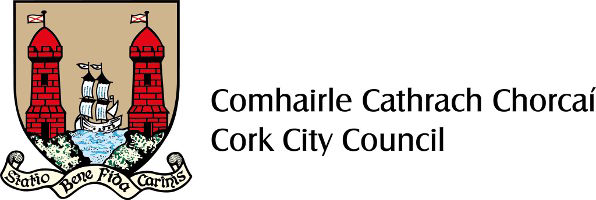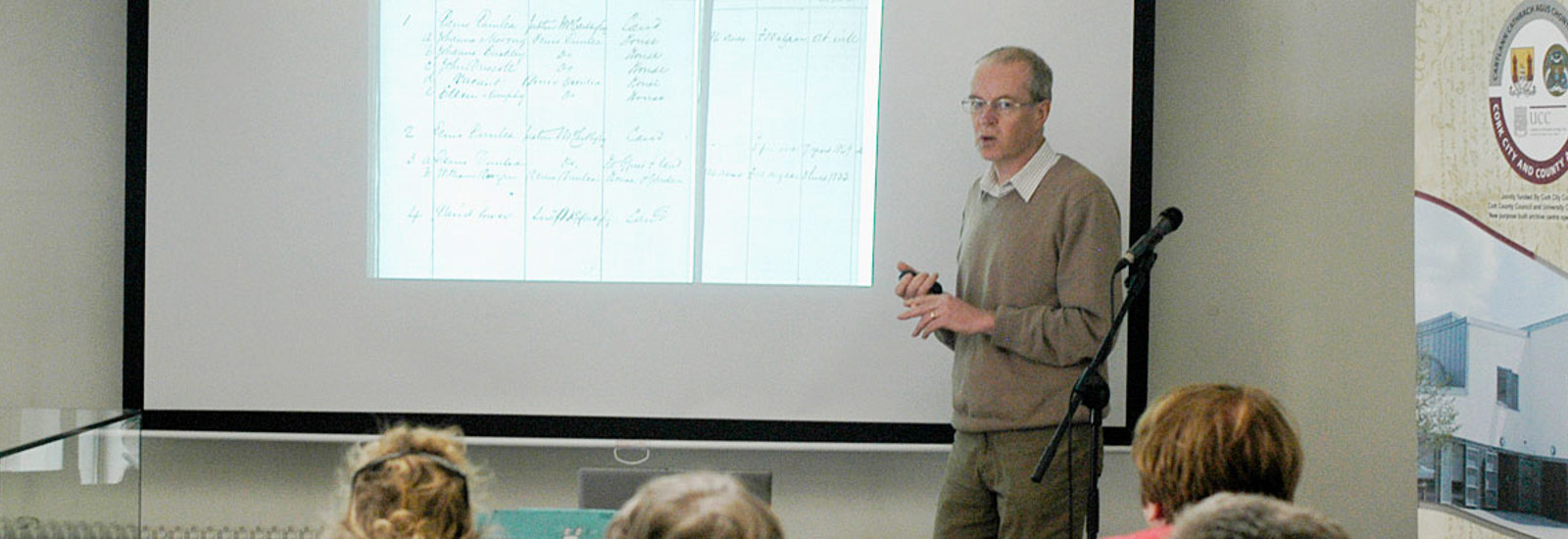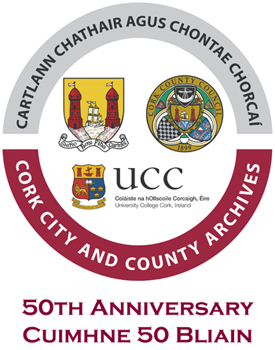Town, Gown, and County
Cork's City and County Archives Service 1971-2021
Article by Brian McGee, Senior Archivist and Secretary
Laying the Corner Stone - Early Development
This year and next (2021-2022) Cork City and County Archives Service celebrates its origins 50 years ago. Back in April 1971, Councillors and management of Cork Corporation (today, Cork City Council) , Cork County Council and University College Cork, and including the librarians of the respective bodies, met for the first time to establish the Cork Archives Council, with the object of taking steps to co-operate and acquire, preserve, and make available, Cork's local archives, in a shared archives institution. A number of important manuscript and archive collections had been acquired by Cork County Library under the management of County Librarian Padraig Ó Maidín, however, it was apparent that the amount of potential archival collections in Cork City and County necessitated the establishment of a stand alone public archives service. The Cork Historical and Archaeological Society played a key role in advocating for this objective. In September 1972, the Cork Archives Council archives service was established located in the basement of Cork Courthouse, Washington Street, Cork under the operation of Cork County Library. This was the first local government-based archives service to be established in Ireland. The first Archivist, Ann Barry, worked in difficult conditions, but much was achieved, with large numbers of archives deposited and made accessible to researchers, and regular public outreach and engagement. The support at the time from University College Cork, Cork County Library, Cork City Library was key. Cork Harbour Commissioners (now Port of Cork) were also supportive. In 1978, Christ Church on South Main Street was acquired by Cork Corporation from the Church of Ireland. The church dates from 1720, and is the site of one of the oldest medieval churches of the city, with strong historical connections to the ancient Cork Corporation of pre-1840. The Corporation carried out the refurbishment and repair of the building to adapt it for archival purposes. In October 1979 Cork Archives Council was renamed Cork Archives Institute, and the service was officially launched at Christ Church in April 1982.
“…this cooperation was more impressive because it existed at a time when archival legislation was still absent or inadequate and when each of these bodies were struggling to fund their own services. An additional cohesion was provided by the link between these bodies and the Cork Historical and Archaeological Society...” (Former Archivist, Patricia McCarthy)
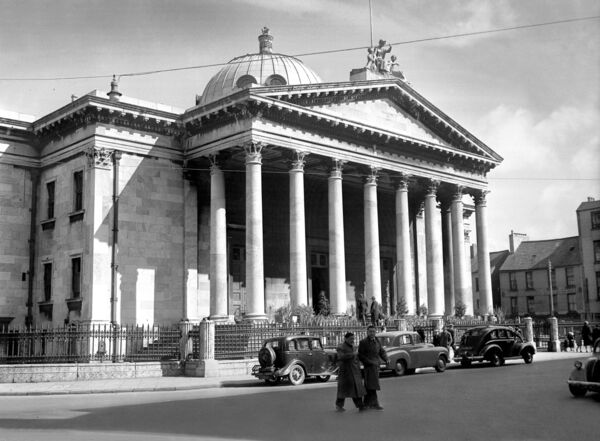
Finding Its Place: 1980s
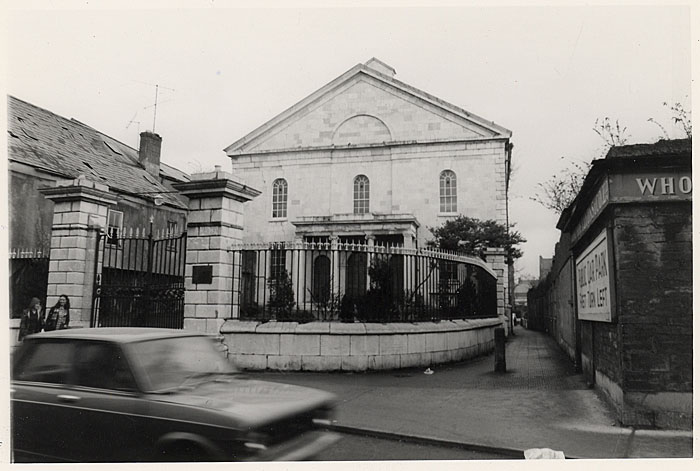
Christ Church, South Main Street, c1980
In April 1983 the Archives Institute held an exhibition at Christchurch, 'Accounts of the Past: Records of the Future' sponsored by Beamish & Crawford brewery. A new, professionally qualified Archivist, Patricia McCarthy, was appointed in July 1985, during the ‘Cork 800’ commemorations. In the move to Christchurch, Cork Corporation assumed responsibility for the day to day operational/executive management of the service. A major programme of collection acquisition of both local government and privately donated archives was instituted, from across the city and county, many of which would have, undoubtedly, been lost to posterity had the building, archives service, Archivist, and the service’s many vocal supporters, not been in place.
“During my period I had the privilege of bridging a gap between two very different generations of public servants. I witnessed the development of a new generation of confident and talented and highly qualified archive and museum professionals. However, I also had the privilege of knowing a previous generation that modestly “held the fort “when there was little or no funding, no statutory basis and sparse thanks or recognition for what they were doing. Collections such as the Youghal Town Records, the Poor Law Records, Cork County Home records, Cork Mental Hospital records all survive because of the work of Cork County Library and Court House staff along with substantial efforts made by various Town Clerks and the County Secretary Edward Marnane. Private papers of important Cork personalities such as Richard Dowden, Liam de Róiste, Siobhan Langford and Geraldine Cummins also survive only because some key individuals recognising their importance. Among such individuals were local historian C.J.F. McCarthy, who was a longstanding chairman of the Cork Archives Institute’s Executive Committee; Walter McGrath, Editor of the Holly Bough, and an authority on Fenianism and Irish railway history; UCC Professor of History, John A. Murphy and the then Curator of Cork Public Museum, Aodh O’Tuama. There were of course very many others too.” (Patricia McCarthy, former Archivist)
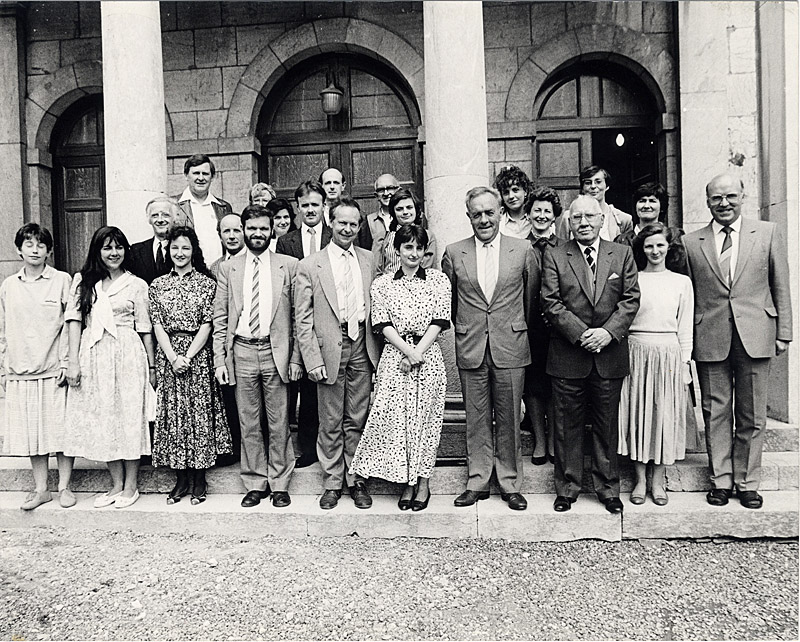
Group at Christ Church 1987. Includes Archivist Patricia McCarthy, City Manager Jack Higgins, Mr. CJF MacCarthy, an early and prominent supporter of the Archives, the first Director of the National Archives Dr. David V. Craig, staff of the National Archives of Ireland; City, County and UCC Librarians, Cork County Council managers, and members of the Irish Society for Archives and the Society of Archivists' Ireland Region, and others.
Patricia McCarthy was in office at a time when things began 'looking up' for Irish archives, with the institution of the National Archives Act and the establishment of the National Archives of Ireland, in 1986. However, the development of the local archives sector remained tenuous, with very few local archives services in existence in Ireland at this time. The support of the National Archives of Ireland Director David V. Craig and NAI staff, was a key element in developing the local archives sector in general and the Cork Archives in particular. Funding was scarce, and the Archives often functioned with a staff comprising 1 archivist and 1 attendant. While Councillors and Council senior management and UCC were undoubtedly supportive of our mission, a general lack of resources in local government put archives and other such services down the list of priorities. The lack of staff meant that the Archives did not have the capacity to list and process the vast bulk of newly acquired collections, in order to make them properly accessible for research. Unfortunately, this situation was to continue until additional staff were appointed in the early to mid 2000's.
A More Prominent Role- 1990s
The local archives sector was transformed, legally, by the Local Government Act 1994 Section 65, which made it a statutory obligation for local authorities to preserve and make available local archives including local government records more than 30 years old, and records deposited by donation, bequest, loan, or purchase. The Archivist in Cork was involved in the promotion and development of the local archives sector during this time. By the late 1990s local archives services were established in several counties and cities across Ireland.
In 1992, the Archives mounted a well-received 'Local Heritage' exhibition, which travelled across the city and county. In 1995-8, the Archives played a prominent role in the local 150th commemorations of the Great Famine including the production of an exhibition ‘Our Dark Legacy’, and a school resource pack. Many very significant business records and health archives were deposited in the Cork Archives in this period thanks especially to the work of archivist Brian Donnelly and colleagues of the Business Records Survey, set up by the Irish Manuscripts Commission, and based at the National Archives of Ireland. A community employment project was instituted to work on the archive of Youghal Corporation and town council, whereby a number of qualified archivists gained the opportunity to gain experience in their chosen profession. Resources, including staff, were, in general, very limited during the 1990s, despite a major expansion in the number of collections acquired and increased expectations of their availability for research, and public outreach and engagement. The lack of resources was, again, a reflection of poor public finances and very limited funds for archives, library, and cultural or heritage services generally. The general unsuitability of Christ Church as an archives repository lead to plans being proposed for the adaptation of the old Bandon Railway terminus to incorporate a purpose built repository for the Archives, however, this did not come about, owing to lack of funding. Despite largely poor resources, much was achieved, including the launch for public research of Seamus Fitzgerald’s archive by the then Minister for Science and Education, Mícheál Martin TD. The Seamus Fitzgerald archive was descriptively listed in detail by contract archivist Carol Quinn. In the late 1990s, the staffing situation improved a little, with clerical support to the Archivist provided by Michael Higgins.
Another major achievement in this period was the organisation, by Patricia McCarthy, Archivist, of a yearly series of one day seminars on 'Local Heritage' held in University College Cork, in conjunction with various bodies, such as the Irish Society for Archives, Cork Historical and Archaeological Society and University College Cork Library.
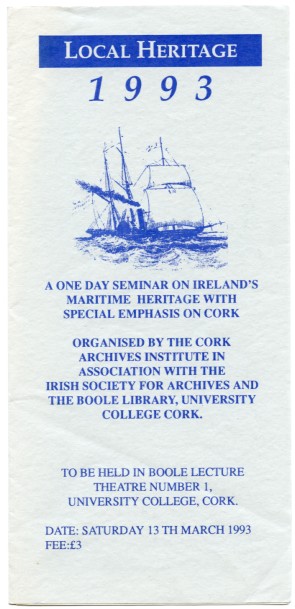
To finish off the decade, and indeed the 20th Century and the 2nd Millennium, in 1999, Cork Archives Institute created an exhibition 'For Cork' to mark the 100th anniversary of the introduction of democratically elected local government with Cork County Council and Cork City Council. The exhibition was based on the rich and extensive records transferred from the Councils to the Archives from its' inception in 1971-2. It covered fascinating events, such as the early origins and development and reform of local government, the election of the first Republican-led Councils in 1920, the first years of local government by Dáil Éireann, and within the Irish Free State, and the introduction of the City/County Management system. The exhibition illustrated how this system was first set up in Ireland in Cork City in 1929 with the appointment of Philip Monahan as the first City Manager, and was later extended to the rest of the country.
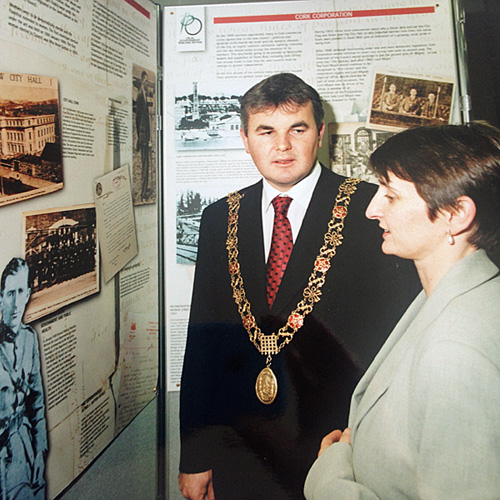
2000-2005 Transition Period
By 2000, such was the success of the Cork Archives Institute in acquiring local archives, it was apparent that Christ Church could no longer cope with the service's storage requirements. The building was also increasingly unsuitable as a permanent repository for preserving and making available unique and irreplaceable archives. Much work was undertaken by Cork City Council staff to maintain the building; however, it was apparent that Christ Church was in need of major conservation works and could never meet the BS.5454 archival preservation standard. The spaces available at Christ Church for processing collections and for public access were also very limited.
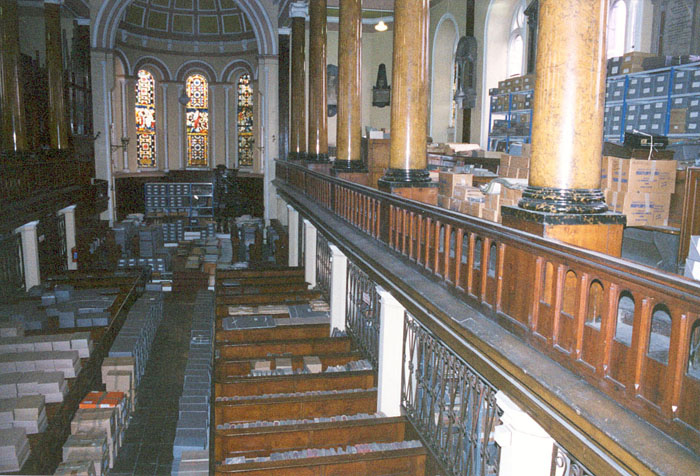
In 2002, a new Archivist, Brian McGee, was appointed. A strategic development plan was developed by the Executive Committee for the expansion of the service in terms of staff, to begin to deal with the huge backlog of unprocessed collections, and to deliver better services to researchers, and to the Councils, who held very large volumes of local authority records requiring professional archival appraisal. Thanks to the strategic plan, the local archives statutory obligation, improved national financial resources, and increased investment in heritage and culture generally by local authorities, Cork City Council and the 3 funding agencies agreed to the appointment of an assistant Archivist, Timothy O’Connor, and the transfer of Library Assistant, Claire Murphy, from the City Library. The additional staffing was a step change in terms of increasing our capabilities. For the first time, we were in a position to begin to process collections and to make them properly and securely accessible for research, while also delivering our services in a more effective and sustainable manner.
Outreach services began to expand from this time onwards, beginning with Archives Awareness Month in 2004, for which we mounted a successful joint exhibition with UCC Library Archives and University College Cork Archives, entitled ‘Town, Gown and County’, at Cork Vision Centre.
One huge step in the modernisation of services in this period was the acquisition of the Adlib Archive collection management and cataloguing database system. The ultimate aim was a searchable public online catalogue and index within 5-10 years covering at least 25% of our collections with item level detail. The Archives at this time also increased its technological capabilities through involvement in a nationally funded digitisation project on landed estate records for the Ask About Ireland website.
2005-2010 Investment and Expansion
Cork succeeded in being awarded the European Capital of Culture for 2005, thus an opportunity arose for possible capital investment. Our strategic development plan for 2005-2010, entitled ‘A New Era for Cork’s Archives’, set out where we wanted to be by 2010, and at the head of the requirements was the need for a new building.
Cork City Council's 2005 Capital Programme saw much investment in cultural institutions and infrastructure. The Council, particularly with the full support of City Manager Joe Gavin, agreed to include a new Archives building in the Programme. A site was identified in Blackpool.
For the Capital of Culture year, while still at Christ Church, the Archives created an exhibition ‘Denny Lane: Renaissance Man’, on the prominent Young Irelander, whose major personal archive had been donated in 2003.
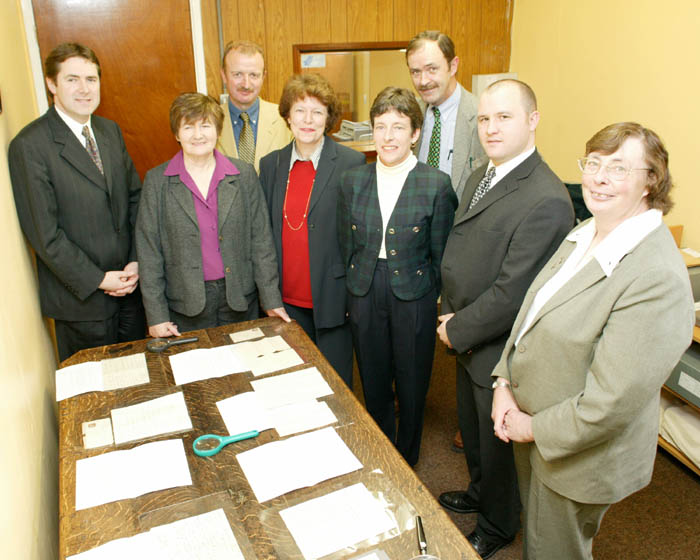
Construction, fully funded by Cork City Council, of the first purpose-built stand-alone archives repository in the State, commenced in 2005. The building was constructed, to meet the then gold-standard BS.5454 (2000), by O’Shea Builders, with design by Stephen Sullivan and colleagues of the City Architect's Department Cork City Council. The design and build process, and the move of our huge collection of archives from Christ Church, were massive undertakings, but Archives' and other Council staff and contractors contributed all their time and energy, to make it a success.
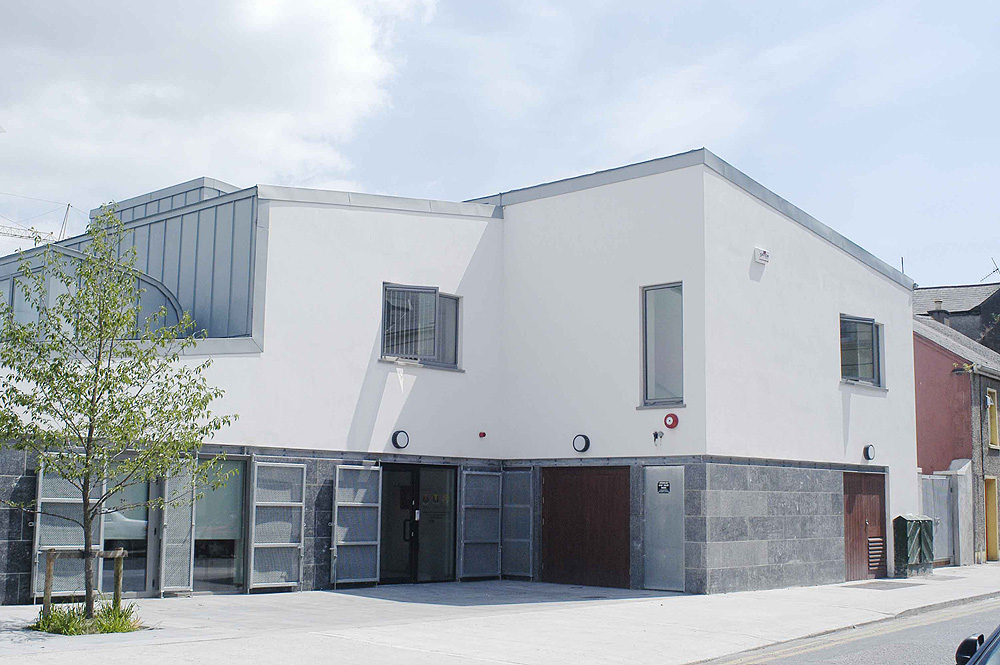
In October 2005, Lord Mayor Cllr. Deirdre Clune and City Manager Joe Gavin greeted the National Archives Advisory Council at the Lord Mayor's Chamber, City Hall. The Council were in Cork to hold their monthly meeting to mark Cork's year as European Capital of Culture. Following their meeting, the Council visited the site of the new Archives building at Blackpool, then under construction.
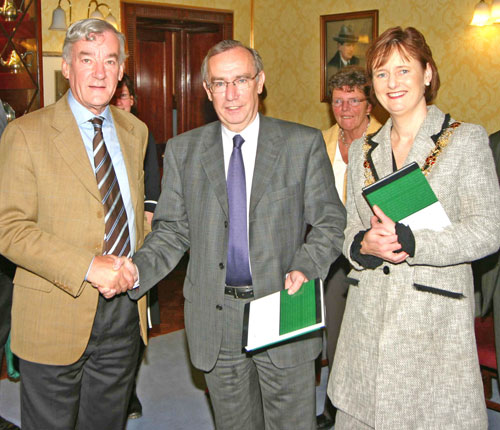
In 2006, we re-launched our service under the new title ‘Cork City and County Archives’ and later that year we mounted a joint exhibition with UCC Library Archives on the ‘Art of Letters’, held in the new archives building, for Archives Awareness Month, and it was later on display at UCC Library.
Cork City Council officially named the new Archives building the 'Seamus Murphy Building' in 2007 to honour the famous sculptor, Seamus Murphy RHA, whose workshop was located in Blackpool. The Archives mounted an exhibition and talks about Murphy to mark the occasion, in conjunction with Blackpool Historical Society and the Murphy family.
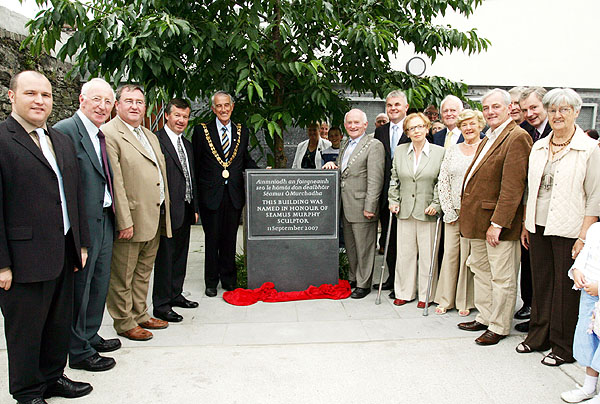
With the new building, staff, and technology, in place, the Archives' capabilities increased, and this was reflected through much greater numbers of research-accessible collections, more research room opening hours, and an active yearly programme of outreach activities. In a boost to our researcher services, we instituted a descriptive listing programme, with the aim of processing and indexing collections to the ISADG international standard, in order to ensure their accessibility for research, and their future security and preservation. A yearly outreach programme was also created at this time, that continues to this day, with regular talks, workshops, group visits, exhibitions, and open days in connection with, for example, the Cork Lifelong Learning Festival, National Heritage Week, International Archives Day, Archive Awareness Week, and Culture Night.
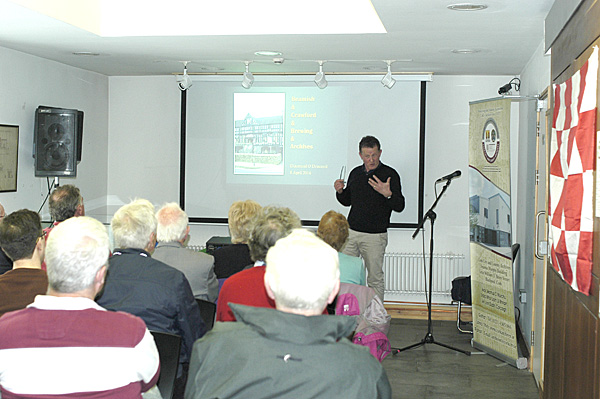
This period also saw the completion of a number of conservation works on damaged documents and collections at the Archives, with grant funding from the Heritage Council of Ireland, including the Richard Dowden ephemera scrapbooks, Bandon Estate Bound Volumes, and the Ryan Purcell estate papers correspondence. The paper conservation and rebinding work in each case was expertly undertaken by Paul Curtis of Muckross Conservation Bookbindery.
In 2008, the Archives created an exhibition celebrating 200 years of the North Cathedral, in conjunction with the Cathedral's historical group. The exhibition was subsequently loaned to the Cathedral for display there.
The Archives teamed up with Cork County Library in 2009 to hold a well-received series of talks and workshops and a travelling exhibition across the County area about local archives and local studies collections, entitled 'Preserving Cork's Archives Together'.
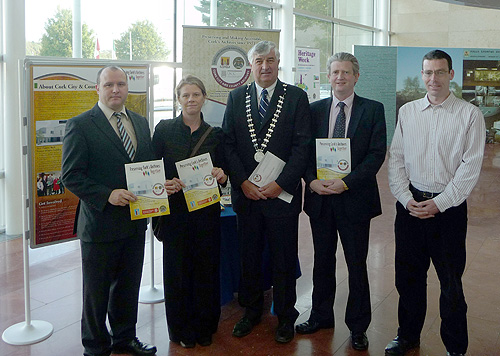
Sharon Casey Heritage Officer; Derry Canty County Mayor, Martin Riordan County Manager, Richard Forrest Executive Librarian
2010 – 2020 A Cultural Institution Takes Its Place
The decade just past saw the Archives take its rightful place as a vibrant Cork cultural institution, an active part of the local fabric of our city and county. The decade began with commemorations for the 90th anniversary of the Burning of Cork, and the life and deaths of Lord Mayors Tomás MacCurtain and Terence MacSwiney. The Archives curated and mounted a very popular and well attended exhibition at the Millennium Hall, Cork City Hall, for Cork City Council, to mark these occasions.
In May 2010 we congratulated Ruth Flanagan, Cork County Librarian, on her retirement, including 30 years’ service on the CCCA Committee. Ruth had been there from the start of the Archives and played a key role in its development.
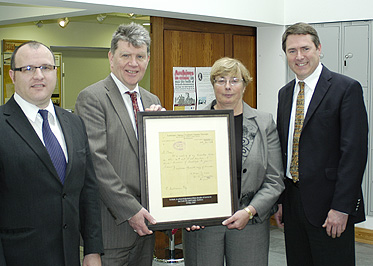
2011 saw the Archives celebrating 40 years in operation with a conference on local archives 'Back Where It Began' at the Imperial Hotel, and also the issue of a special edition of the journal Irish Archives. Also in 2011, on the request of the Lord Mayor and City Council, we produced an historical exhibition to mark the 75th anniversary of the opening of the new Cork City Hall in 1936 based on drawings and city council records held at the Archives. This was created in-house and was displayed for several months outside the Council Chamber at City Hall.
In this period, to assist our family history and genealogy researching public, we began to digitise and publish online of several sets of cemetery burial registers from our collections.
2012 saw the Archives fund and design an exhibition in conjunction with the Mother Jones Festival organisers, ‘The Miners Angel: Mother Jones’, to mark the 175th anniversary of Jones’ birth in Cork.
Another highlight of this period was our involvement in the UCC History Department ‘Revolutionary Roadshow’ in Clonakilty GAA Club, which was attended by over 300 people. The Archivist was on hand to discuss memorabilia and documents. The event was a great success with a number of contacts established with people with significant archival material in their possession.
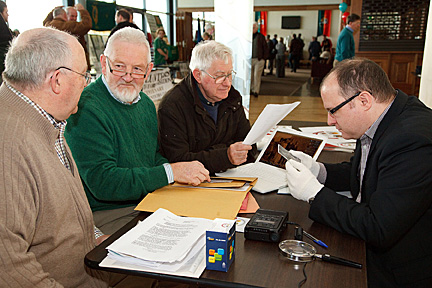
By 2014, following 10 years of intensive work on Phase 1 of our collections processing/listing programme, we had completed the item level processing, to the ISADG international standard, of over 200 collections including several major collections and dozens of small collections. The surviving 14 Boards of Guardians’ archives for Cork, the major personal archive from Mayor of Cork Richard Dowden, and the archive from the Cork Steampacket Company are examples of major collections completed. These archives offer a rich and unique insight into the world of 19th and 20th century Cork. On foot of this success, 2014 saw the launch of our searchable online catalogue containing data on the 200 collections, including 8,000 item entries and several thousand name/institution/subject index points. Today (2022) our online catalogue has over 40,000 entries.
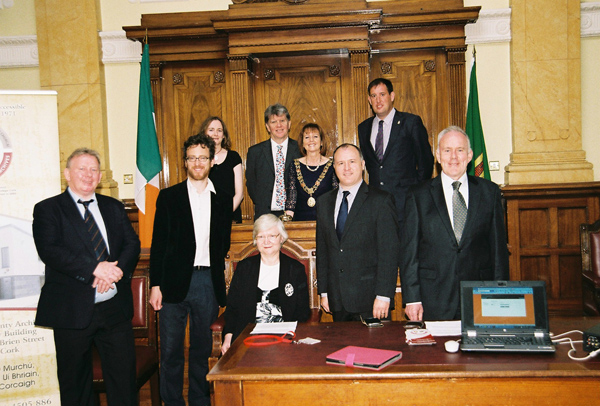
The Archives mounted a major exhibition in 2013-14 entitled ‘Chillingworth and Levie 20th Century Architecture in Cork’, curated by Louise Harrington, Architectural Historian. This was based on our Chillingworth & Levie architectural drawing archive, that was saved from destruction in the 1990s with the assistance of Crawford Art Gallery and others. The exhibition was funded by a national government grant, and it examined how some of Cork’s best-loved buildings were conceived and developed.
In 2015 we created an in-house exhibition ‘Moments In Time’ about life in, and archival material from, Cork City and County on the eve of the 1916 Rising.
The Archives was extraordinarily busy with outreach projects to mark the 2016 centenary of the Easter Rising, mounting a successful programme that included the production and publication of a book, Voice of the Many: Local Archives from Cork 1914-1916, a set of online school resource packs ‘Through War and Rebellion’ on Cork in the 1912-1918 period, the digitisation of Liam de Roiste’s diaries for 1914-1916, monthly guided tours, an exhibition ‘For the Record: Cork 1916’, talks, and the archiving of material from 1916 centenary events across the city and county.
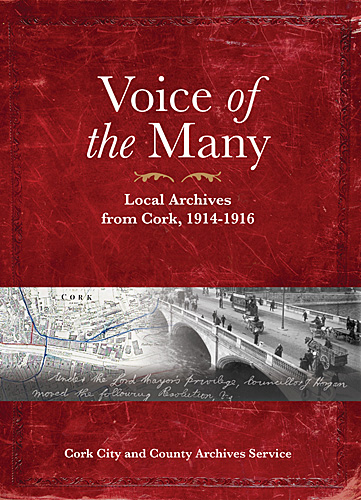
2016 saw the very public donation of the important Daniel MacCarthy Glas archive by his descendants Susan and Donal MacCarthy and family of Oregon, USA. To mark the occasion and to celebrate Daniel’s life, the Archives was involved in holding the MacCarthy Archive Homecoming and Weekend May 2017, in Dunmanway, together with organisers Michelle and Mervyn O'Driscoll and the UCC School of History.
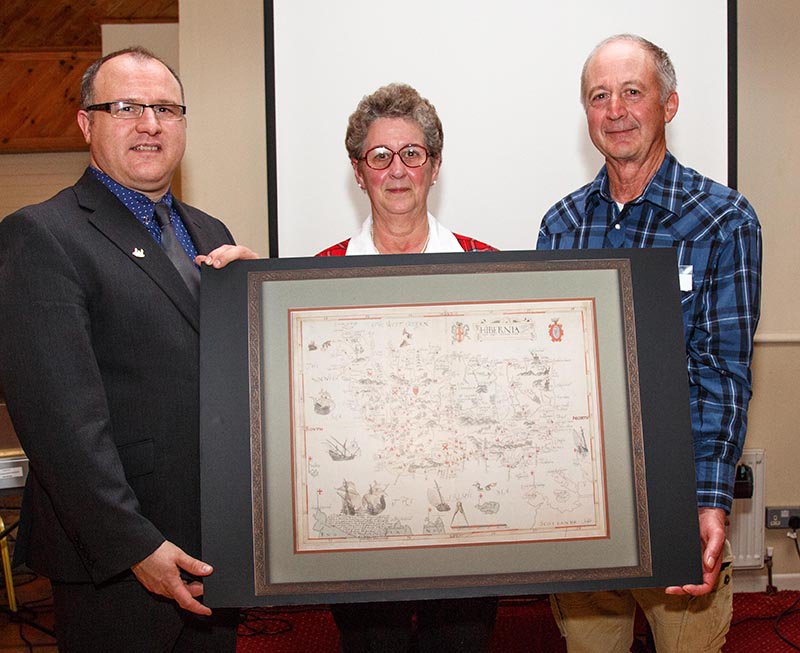
From 2000 to 2020, the CCCA continued its success of previous decades, in acquiring vast numbers of new archives. In fact, almost 850 new accessions were received, from local government and from private depositors. This includes a long list of major sets of archives, such as further records from Cork City Council, Cork County Council and archives from Port of Cork/Cork Harbour Commissioners, Cork Savings Bank, Beamish & Crawford Brewery, various Town Councils, numerous solicitors’ papers, Bennett & Co. Maltings, many trade unions, clubs and societies, a number of large photographic collections such as that of Anthony Barry, and several large personal and family archives such as that of IRA man Connie Neenan, DD Sheehan MP, Lord Mayor Jennie Dowdall and IRB man Diarmaid Fawsitt. The support of archive creators and depositors from the community is a key enabler of our work.
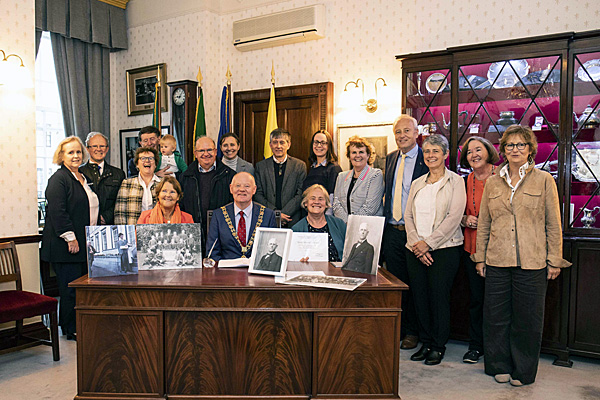
Digitisation has been ramped up in recent years, with a concentration on photographs, cemetery registers, and Revolutionary Period (1912-23) collections. This has included, for example, several hundred of the photographs from Anthony Barry’s archive, the 1877-1917 registers of St Joseph’s cemetery, the 1867-1930 St. Finbarr’s Cemetery registers, and Liam de Roiste’s diaries for 1916-1922. In 2018, the Archives was successful in obtaining a Community Foundation of Ireland grant to purchase a new, state of the art, Zeutschel A2 conservation-grade book scanner.
2019 saw the delivery of our novel and successful ‘Archives of Us’ Creative Ireland workshops on the revolutionary period, with historian Dr. Áine Sheehan, and associated artistic commissions by artists Brian MacDomhnaill and Marianne Keating.
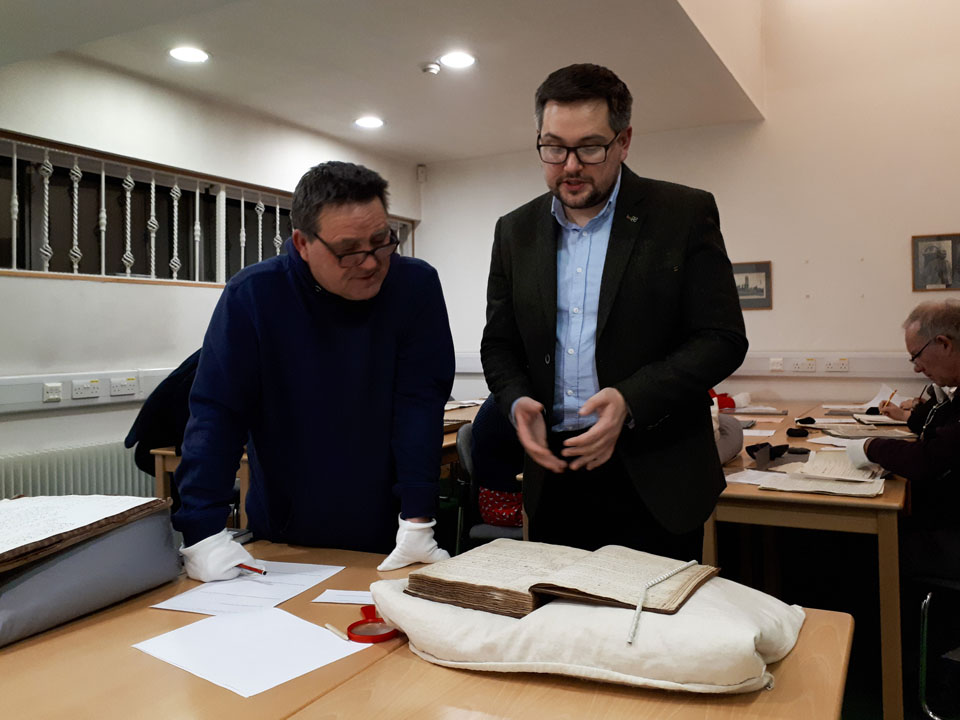
In 2020 the Archives was directly involved in the City Council's revolutionary period commemorations for the 100th anniversary of the first democratic local election, and of the life and deaths of Lord Mayors Tomás MacCurtain, Terence MacSwiney, and of the Burning of Cork. Our contributions included the creation of 2 souvenir booklets on the Lord Mayors and an exhibition, 'Enduring Legacy', as well as much online content and public engagement through Facebook and Twitter. Also in 2020, we congratulated Liam Ronayne, City Librarian, on his retirement. Liam was on the Archives' Executive Committee for 16 years, with many of those years spent in the key role of chairperson.
Today, in 2021, we now have over 1,200 archives (archival collections) in our holdings, containing an estimated 300,000 items, comprising several million pages or images of unique records. We have fully processed and listed almost 800 collections at item level detail to international standards. A number of digitised collections are available online on our web site, which has been redesigned, expanded, and updated. Our online catalogue contains over 40,000 entries and 5,000 subject/institution/person index points that users and researchers can use to locate material relevant to their research. In terms of infrastructure and the accessibility of our collections, and the visibility and extent of services delivered, we have, therefore, come a very long way since the 1970s. It is hoped that, in the coming years, there will be further investment in the service, particularly in additional staff and storage space, to enable us to process all legacy collections and all new incoming collections, acquire new collections, cope with a marked increase in demand for our services from the public and researchers, and deliver an active and sustainable programme of outreach and public engagement.
Our Service Users
In terms of users, over the past 5 decades we have been a key information source for those conducting historical, scientific, family history, and other research, making available our archival collections in our research room and online. Our users have included, for example, academic and local historians, social scientists, postgraduate and undergraduate third level students, teachers and lecturers, the media, local community and cultural heritage groups, local authority staff, artists, writers, staff from other cultural institutions, and those researching genealogy and family history. The support of University College Cork in funding the CCCA has reflected the fact that we have been a major repository for research by students and staff of the university, and other colleges and schools in the region, plus those from other national, and international, institutions. Our collections and services have enabled a vast range of PhD, Masters theses. undergraduate theses, books, plus newspaper, journal and magazine articles, heritage projects, lectures, conferences, exhibitions, art works, TV, radio and internet productions, building conservation projects, and family histories, all of which add to the local and national knowledge base. We have also developed an audience of non-research users over the past 3 decades, through outreach projects such as talks, seminars, exhibitions, workshops, online content and publications aimed at the general public and lifelong learners. The CCCA also answers thousands of research queries every year, many from overseas relating to family history.
Local Archives
With regards to local archives generally, the new GDPR Data Protection regime since 2018, has, arguably, the potential to improve the picture by stimulating policy on records retention, while providing legal derogations for preserving and making accessible archives for archiving purposes in the public interest and for historical, scientific and statistical research purposes, provided safeguards are in place for personal privacy and to protect data subjects' fundamental rights and freedoms. Arguably, it is on this trusted basis that public service archives services, such as CCCA, have always operated. We just need to ensure, in my opinion, that it is understood that 'Data Protection' does not always equal 'Data Destruction', when it comes to our public records. It means just that, protection. Privacy and data protection are not incompatible with archiving, once safeguards are in place, such as data minimisation, plus secure storage and restricted access. In fact, the proper archiving and secure availability of public records containing personal data is often essential for upholding the rights of data subjects, a fact brought to the fore by recent state commissions of enquiry involving historic health records. Public archiving is, of course, also essential for ensuring that the nation's history and memory is preserved, and that thus future historians and other researchers have records available to do their work.
Conclusion
Thanks to the far-sighted decision in 1971 to establish a local Cork archives service, 25 or more years before most other cities/counties in Ireland, we have had the opportunity and means to preserve large numbers of records that otherwise would have been lost. Our service is the largest and most developed local archives service in Ireland. Our collection is one of Cork's largest and most important cultural heritage and information assets. It is of both local, national, and international importance, a unique and irreplaceable mine of accessible records documenting Cork's history and its people, culture, places, and organisations. The volume and quality of archives deposited, and the archives services delivered today, are a testament to the co-operation between Cork City Council, Cork County Council, and University College Cork, the work of the staff of the Archives, and the support and expertise of the Archives' Executive Committee. Also vital has been the support of elected Council members, staff and management of the Councils and UCC, colleagues in library and museum services, and that of the Cork Historical and Archaeological Society and the wider community. We must also pay tribute to all the Archives' and Council staff over the years, who undertook all of the, often unglamorous and unheralded, but essential and demanding, work on acquiring, accessioning, cleaning, boxing, numbering, tagging, shelving, retrieving, listing, indexing, searching, processing, digitising, managing, and making accessible, vast volumes of local records and archives.
Preserving and making available archives is, of course, not only about cultural heritage and academic research and education. Archives are also vital sources of information for upholding the rights and responsibilities of citizens and institutions, a key quality of life indicator. On this note, here is an extract from the Universal Declaration on Archives, which was endorsed by the 36th General Session of UNESCO in Paris in November 2011:
“Archives record decisions, actions and memories. Archives are a unique and irreplaceable heritage passed from one generation to another. Archives are managed from creation to preserve their value and meaning. They are authoritative sources of information underpinning accountable and transparent administrative actions. They play an essential role in the development of societies by safeguarding and contributing to individual and community memory. Open access to archives enriches our knowledge of human society, promotes democracy, protects citizens' rights, and enhances the quality of life. “
I will conclude by picking up on the inter-generational theme of the UNESCO Archives Declaration. Many of Cork's local archives collections that survive today, have survived because there has been an unbroken chain of custody, often simply the concern of a wise official or private individual, or a series of such people, through the decades, or centuries in some cases, who recognised a set of records' or a document’s possible research/historic value and importance. I will, therefore, dedicate the 50th anniversary of the Archives to all of the people, and organisations, documented and undocumented, who created and kept the records, and all of those who ensured that a host of Cork’s local archives have become permanent public records, for the benefit of current and future generations.
*******
Appendix
Members of the Original Steering Committee of the Cork Archives Council
Denis O'Sullivan, County Councillor
Gerald Goldberg, Cork City Alderman
D.J O'Donoghue, County Library Committee
Padraig Ó Maidín, County Librarian
Prof. John G. Barry, UCC
Miss N. Browne, UCC Asst. Librarian
Matt Richmond, Assistant Town Clerk Cork City
Sean Bohan, City Librarian
CJF MacCarthy, City Library Committee
Current, Former, and Acting Members of the Executive Committee of the Archives
Cork City Council/Cork Corporation (City Librarian)
David O’Brien
Liam Ronayne
Eamon Kirwan (A)
Hannah O’Sullivan
Anne Coleman (A)
Séan Bohan
Cork County Council (County Librarians)
Emer O’Brien
Bernie Wallace (A)
Eileen O’Brien (A)
Michael Plaice (A)
Ruth Flanagan
Padraig Ó Maidín
University College Cork (Librarians)
Colette McKenna
John Fitzgerald
Thomas Crawshaw
Patrick Quigg
Daniel O’Keeffe
Current and Former Staff of the Archives
Senior Archivist (Head of Service and Secretary of Executive Committee)
Brian McGee
Archivist (Head of Service and Secretary of Executive Committee)
Brian McGee
Patricia McCarthy
Ann Barry
Local Government Archivist/ Assistant Archivist
Timothy O'Connor
Steven Skeldon
Archives Assistant
Claire Murphy
Michael Higgins
Archives Attendant
Paul Cronin
Peter McDonnell
Anthony Carroll
Richard T. Cooke
Douglas Walshe
*******
Sources
Internal archive of Cork City and County Archives/ Cork Archives Institute 1971-2020
© Cork City and County Archives Cork City Council 2021
